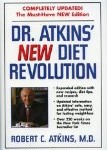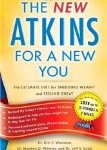 It was on Atkins that I lost the most weight I have ever lost on a diet and managed to keep it off the longest. This is because I find the low carb eating style the easiest to follow and the most satisfying. So, you might be thinking, if Atkins works, why did she abandon it back in 2007?
It was on Atkins that I lost the most weight I have ever lost on a diet and managed to keep it off the longest. This is because I find the low carb eating style the easiest to follow and the most satisfying. So, you might be thinking, if Atkins works, why did she abandon it back in 2007?
When I started on Atkins in early late 2004, I was at the end of my rope. I had reached an all-time high for my weight despite having tried NutriSystems, Weight Watchers, Jenny Craig, and myriad other popular or self-designed diets. I saw two nutritionists at different times, and also hired a personal trainer.
Every single one of my diets worked—for whatever period of time I was able to discipline myself to follow them. It wasn’t easy to avoid the foods I really wanted to eat, to measure every serving or count every calorie or fat gram. It seemed I was always hungry and craving specific foods I knew I couldn’t have. With exception to the personal trainer, who came to my house once a week for a few months, all the exercise programs I tried eventually became boring and lonely efforts. Then I had to give up the trainer because she was too expensive.
When I read Dr. Atkin’s New Diet Revolution, I really didn’t believe it would work any better than the other programs. It just intrigued me because it took a completely different approach. Instead of counting calories and measuring my foods, I would simply count net carbs and avoid eating “the white stuff” (starches and sugars). The Induction Phase promised to jump-start my weight loss and I felt in need of a good jump-start! So, I followed the diet strictly, eating exactly what it said to eat, which included proteins, fats, and mostly green vegetables.
I realized immediately that I was not hungry. Then I noticed I wasn’t craving foods at all. By the end of two weeks, I was down several pounds and feeling lighter. I kept going on Induction because it wasn’t difficult. After a couple of months, I added nuts, berries, low carb whole grain tortillas, and some other low carb foods to the diet. I relied on Atkins bars and shakes occasionally for snacks. I also indulged myself several days a week with a Starbucks venti breve latte, a large espresso drink made with coffee and half-and-half. In the summer I drank it iced and in the winter, hot.
I lost 70+ pounds in about 9 months and people were telling me I looked great. I was down about 4 clothing sizes from where I began and I had a lot more energy. Then I hit a plateau. For the next two years, my weight didn’t budge. This was really remarkable because my weight had always fluctuated a lot. I continued to eat exactly as I’d become accustomed on Atkins—no sugars, no starches, but the weight loss had stopped.
In 2007, there were a lot of media reports that the Atkins diet wasn’t healthy. Well-meaning members of my family were pressuring me to give the diet up. Meanwhile, I was getting frustrated with my stuck scale. When the holidays came, I was feeling down because a close relative had died and I also felt a lot of pressure from a volunteer job I held. It was Christmastime and I was tempted to try the cookies I was baking for my kids. Then we hosted a party at our house and I cooked all my favorite non-Atkins foods for it. I told myself I deserved a holiday break from dieting.
After the holidays ended, I thought it would be easy to get back on the program, but it wasn’t. I kept telling myself I’d find another diet, one that didn’t have so much controversy. I wondered if the plateau I’d reached meant the diet was faulty.
Now, I’ve spent the past year planning to diet. (If you’re not a chronic dieter, you may not understand how we can make a project of planning to diet). I read several books, surfed the Internet, and talked to my doctor and my friends. At the end, I have concluded that there are many good diet and exercise programs out there—and most will work for many people. However, in my opinion, the success of a diet and exercise regime is dependent on two factors: (1) it must fit your tastes and life fairly well, and (2) you must commit to it as a new lifestyle.
 Looking back, I note that my program on Atkins had incorporated foods I liked to eat anyway, proteins, moderate fats, green vegetables, tomatoes, mushrooms, etc. I like to eat those foods. Measuring net carbs was not difficult once I understood how to do it. You basically take the Total Carbs listed on a label and subtract the Carbs that are not sugars (fiber carbs). You end up with Net Carbs (the carbs that will result in weight gain if you don’t hold them back to the level that your body can metabolise them). This sounds complicated, but the Atkins people explain it well. They even have a brand new book that takes a fresh look at the diet, New Atkins for a New You: The Ultimate Diet for Shedding Weight and Feeling Great
Looking back, I note that my program on Atkins had incorporated foods I liked to eat anyway, proteins, moderate fats, green vegetables, tomatoes, mushrooms, etc. I like to eat those foods. Measuring net carbs was not difficult once I understood how to do it. You basically take the Total Carbs listed on a label and subtract the Carbs that are not sugars (fiber carbs). You end up with Net Carbs (the carbs that will result in weight gain if you don’t hold them back to the level that your body can metabolise them). This sounds complicated, but the Atkins people explain it well. They even have a brand new book that takes a fresh look at the diet, New Atkins for a New You: The Ultimate Diet for Shedding Weight and Feeling Great
I must remember that my previous experience with Atkins had not included any exercise at all—and I was also drinking a large drink made with half-and-half almost every day. I believe now that, when I hit my plateau, had I started some exercise and dropped the lattes down to one a week or fewer, I probably would have seen the scale move down again. Since 2007, I have also come to understand that I struggle with depression and that foods, especially starchy and fatty foods, have been a drug to me for as long as I can remember. I also realize that I have a propensity to bite off more than I should chew in other ways. I like to be extremely busy and intellectually stimulated at all times. I tend to over-commit myself by volunteering or taking on projects that consume me while I cope by consuming too much food. My doctor recently proclaimed me a classic Type A Personality.
So, I have decided that Atkins fits my eating preferences and lifestyle best. It has worked for me before and I feel optimistic that it will work again. I also feel it could work better this time because I have gained some insights into plateaus and depression that I didn’t know before. I am presently following the Induction Phase of Atkins right now, drinking lots of water, and also taking some vitamins and supplements that my doctor recommended, as follows:
Centrum Silver Ultra Women’s multivitamin – 1 daily
Nature’s Bounty Odorless Omega-3 Fish Oil, 1000 mg softgel – 2 daily
Caltrate 600 D+Minerals, Calcium, Vitamin D, minerals – 2 daily
Fibersure fiber supplement, clear mixing powder, 5 g dietary fiber, soluble – 1 rounded teaspoon, occasionally (minimum once a day)
Wish me luck!